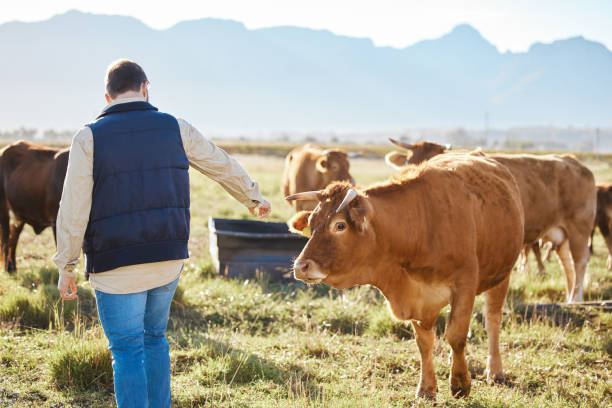As a major agricultural region in Western Australia producing a significant amount of the state’s livestock, it is critical that farmers in the Perth region prioritize health management for their herds and flocks. Implementing proactive health measures not only ensures better animal welfare outcomes, but also protects the financial viability and productivity of farming operations. One of the most vital health management practices for livestock producers is maintaining comprehensive vaccination protocols to prevent infectious diseases which can rapidly spread through a herd or flock.
The Benefits of Livestock Vaccinations
Vaccinating livestock provides two major advantages for farmers in Perth and across WA. Firstly, vaccines prime the immune systems of animals to quickly recognize and fight off dangerous pathogens before they can infect the body and cause disease. This prevents livestock mortality and the loss of capital invested in building up a viable breeding herd. Secondly, by limiting the spread and effects of contagious illnesses through a herd, productivity in terms of growth rates, milk yield, wool production and reproductive performance are maximized across the board. Maintaining rigorous vaccination schedules protects the bottom line of producers by avoiding disruptions to farm output.
In an era of increasing intensification where larger herd and flock sizes are the norm in WA agriculture, the importance of “herd immunity” conferred through widespread vaccination coverage has never been greater. With more animals housed in smaller spaces, the risk of rapid disease transmission is heightened. Vaccines enable farmers to safely increase production without heightening the threat of catastrophic disease outbreaks which could potentially affect hundreds or thousands of animals.
Priority Livestock Diseases Targeted by Vaccinations
There are a range of viral, bacterial and parasitic diseases which pose major risks to livestock health in the Perth region if vaccination coverage is inadequate.
These include Clostridial diseases such as Pulpy Kidney and Tetanus which can inflict sudden deaths in sheep and cattle, reproductive diseases like Vibriosis which causes infertility and abortions, endemic parasites such as Barbers Pole Worm, and highly dangerous foreign animal diseases like Foot and Mouth Disease that would have drastic impacts on export market access if an incursion occurred in Australia.
While many livestock diseases have been extensively eradicated across WA, it only takes one traveling stock carrier or contaminated delivery vehicle to spark an emergency disease outbreak. Maintaining comprehensive vaccination coverage removes this threat and allows farmers to move stock between properties or regions without fear of spreading illnesses.
Vaccine Options Available for Livestock Producers
The good news for livestock producers in Perth is that there are excellent vaccination options available against all major diseases posing a threat. With many large pharmaceutical chains such as Zoetis, Elanco, Boehringer Ingelheim and Merck operating in Australia, farmers have access to international quality vaccine products designed specifically for Australian conditions.
Both viral and bacterial vaccines are formulated to contain either modified live strains of pathogens to promote antibody production, or inactivated versions of pathogens that retain immune-stimulating antigens. Parasitic worm vaccines utilize specialized proteins derived from the worms’ digestive tract to block establishment in livestock.
These vaccines are available in formulations that suit the type and age of livestock requiring disease prevention. Options include oral drenches, gels, injectables, intranasal sprays and embryo transfer vaccines to pass protection from mother to offspring. Farmers can work with their local veterinarians to develop customized annual vaccination schedules meeting the needs of their enterprises.
Adopting Innovative Vaccine Delivery Methods
To simplify vaccination schedules and prevention against multiple diseases, Perth farmers are increasingly adopting multivalent vaccines which combine antigens from different pathogens into a single inoculation. This reduces labor requirements and eliminates stress on livestock associated with mustering and yarding for multiple vaccine administrations.
New innovatory approaches utilized overseas such as needle-free vaccine delivery including intranasal sprays and transcutaneous immunization through skin patches are also becoming more widely available. Collaboration between pharmaceutical developers and leading research institutions like the Harry Butler Institute at Murdoch University will ensure WA farmers have access to the latest vaccine advancements tailored for the predominant livestock industries across the state.
A Shared Responsibility Between Farmers and Government
While farmers must proactively vaccinate their own herds, protecting Australia’s overall disease-free status also requires responsible policy, regulation and investment from government agencies. Stringent biosecurity measures preventing exotic disease incursions are maintained by the Federal Department of Agriculture and Water Resources, while tracing and eradication efforts for local outbreaks are led by state Departments of Primary Industries and Regional Development.
Government authorities also partner with industry bodies such as the Cattle Council of Australia to fund subsidy schemes making newer premium vaccine technologies more affordable for uptake on a wider scale across the country. Recent examples include subsidies for viral reproductive disease vaccines in northern beef herds. Every player across the vaccine supply chain has a role maintaining Australian agriculture’s international competitiveness through rigorous disease prevention.
The Future of livestock Vaccinations
Livestock vaccinations will continue advancing as technology and research provide new options for farmers. RNA particle vaccines utilizing specialized genetic code to stimulate immunity are in development, along with vector-based designs inserting antigens into harmless viral carriers.
New adjuvants to further amplify reactions, antibody identification kits to test vaccine effectiveness, and vaccines incorporating insect saliva proteins to also prevent parasite transmission by flies and mosquitoes are progressing through trials. With a global push towards food security amidst a growing population, the economic and ethical impetus to prevent livestock disease will only expand. By upholding vaccination protocols and embracing innovations, the Perth region’s farmers will keep pace with the latest developments into the future.
Final Words
Adhering to expert health management advice, maintaining an adequate vaccination budget, confirming batches and booster schedules, correctly storing and handling vaccines, and accurately recording all inoculations enables farmers to fulfill their responsibility in protecting livestock health. With farmers and government working cooperatively and capitalizing on cutting-edge R&D, the future remains bright for agricultural production in Perth and across the nation.


